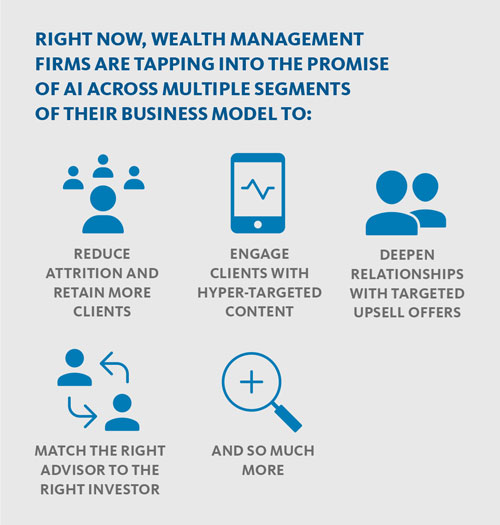Are you ready to unlock the secret to unlimited wealth? Look no further than “The Future of Wealth: Transforming Business with AI”. This revolutionary product is here to revolutionize the world of business and make money-making easier than ever before. By harnessing the power of Artificial Intelligence (AI), this product will transform the way you do business, maximizing your profits and catapulting you towards financial success. Get ready to step into the future of wealth with “The Future of Wealth: Transforming Business with AI”.

The Role of AI in Business Transformation
Artificial Intelligence (AI) has become a transformative force in various industries, and its impact on business cannot be underestimated. Understanding the capabilities of AI and how it can revolutionize different aspects of business operations is crucial. From decision making and automation to market analysis and predictive analytics, AI offers a range of possibilities that businesses can leverage to drive growth and innovation.
Understanding AI and Its Capabilities
AI refers to the simulation of human intelligence in machines that are programmed to think and learn like humans. It encompasses various technologies such as machine learning, natural language processing, and computer vision. The core idea behind AI is to enable machines to perform tasks that typically require human intelligence, such as problem-solving, pattern recognition, and decision making.
The capabilities of AI are vast and constantly evolving. Machine learning algorithms, for example, allow systems to learn from data and improve their performance over time. Natural language processing enables machines to understand and analyze human language, while computer vision empowers them to interpret and process visual information. These capabilities have paved the way for AI’s integration into various business functions, transforming the way organizations operate.
The Impact of AI on Business Models
AI has the potential to disrupt traditional business models and create new opportunities for growth. It enables businesses to automate routine tasks, streamline processes, and make data-driven decisions at a faster pace. By leveraging AI technologies, companies can enhance their operational efficiency, reduce costs, and ultimately deliver better products and services to their customers.
One of the key impacts of AI on business models is the ability to unlock valuable insights from data. With AI-powered analytics, businesses can gain a deeper understanding of their customers, identify market trends, and make informed business decisions. This data-driven approach allows organizations to personalize their offerings and tailor their strategies to meet the specific needs and preferences of their target audience.
The Role of AI in Decision Making and Automation
AI plays a crucial role in enabling businesses to make better decisions and automate various processes. Through machine learning algorithms, AI systems can analyze vast amounts of data, identify patterns, and make predictions or recommendations based on the insights gained. This not only saves time but also improves the accuracy and effectiveness of decision making.
Automation, another key component of AI, allows businesses to streamline their operations and minimize human intervention in repetitive tasks. AI-powered robots and software can perform tasks faster and more efficiently than humans, reducing costs and increasing productivity. From manufacturing and logistics to customer service and data entry, AI automation is transforming the way businesses operate across industries.
AI in Investment and Wealth Management
The financial industry has been an early adopter of AI, particularly in the field of investment and wealth management. AI-powered systems are revolutionizing investment strategies, enhancing portfolio management, and transforming the role of financial advisors.
The Rise of AI in Investment Strategies
AI has gained significant traction in investment strategies, particularly in the area of quantitative trading. By analyzing vast amounts of historical data and identifying patterns, AI algorithms can make predictions about the future performance of individual stocks or entire markets. This allows investment firms to make data-driven decisions and improve the accuracy of their investment strategies.
Additionally, AI-powered algorithms can execute trades at a much faster pace than humans, taking advantage of small price discrepancies in the market. This high-frequency trading enables investment firms to generate profits by leveraging the speed and precision of AI-driven systems.
Enhancing Portfolio Management with AI
AI is also transforming portfolio management by providing real-time insights and recommendations. With AI-powered analytics, wealth managers can analyze market data, track investment performance, and identify potential risks or opportunities. This enables them to optimize portfolio allocations, minimize risks, and generate higher returns for their clients.
Moreover, AI technologies enable personalized portfolio management by considering individual investors’ risk appetite, investment goals, and preferences. By leveraging AI algorithms, wealth managers can create tailored investment strategies that align with their clients’ specific needs and financial objectives.
The Future of Robo-Advisors
Robo-advisors, AI-driven platforms that provide automated investment advice and portfolio management, have gained significant popularity in recent years. These platforms use AI algorithms to analyze investors’ financial information and recommend investment strategies accordingly. Robo-advisors offer a convenient and cost-effective solution for individual investors, as they eliminate the need for traditional financial advisors and provide easy access to investment opportunities.
As AI continues to advance, robo-advisors are expected to become more sophisticated in their capabilities. They may integrate natural language processing and machine learning to provide more personalized and interactive services to investors. The future of robo-advisors holds the promise of democratizing wealth management and making investment opportunities accessible to a wider range of individuals.

AI-driven Customer Experience
In today’s competitive business landscape, providing exceptional customer experience is essential for sustainable growth. AI technologies play a pivotal role in enabling businesses to deliver personalized, efficient, and insightful customer experiences.
Personalization and Customer Insights with AI
AI allows businesses to gather and analyze vast amounts of customer data, enabling them to gain valuable insights into their preferences, behaviors, and needs. This data-driven approach enables businesses to offer personalized recommendations, tailored promotions, and customized experiences to their customers.
By leveraging AI-powered analytics, businesses can identify individual customer segments, understand their purchasing patterns, and anticipate their future needs. This not only enhances customer satisfaction but also leads to increased customer loyalty and repeat business.
Chatbots and Virtual Assistants for Enhanced Customer Service
AI-powered chatbots and virtual assistants are revolutionizing customer service by providing instant, round-the-clock support to customers. These chatbots use natural language processing capabilities to understand and respond to customer queries, provide product recommendations, and assist with various transactions.
Chatbots offer businesses the ability to scale their customer service operations and provide quick and efficient support to a large number of customers simultaneously. They can handle routine inquiries, resolve simple issues, and escalate complex problems to human agents when necessary. This not only improves customer satisfaction but also reduces the cost of customer support for businesses.
AI-enabled Customer Relationship Management
AI technologies have transformed customer relationship management (CRM) by automating and enhancing various aspects of customer interactions. AI-powered CRM systems can analyze customer data, predict customer behavior, and provide personalized recommendations to sales and marketing teams.
By leveraging AI in their CRM systems, businesses can optimize lead generation, sales forecasting, and customer segmentation. AI algorithms can analyze customer data to identify patterns and predict future buying behaviors, enabling businesses to target their marketing efforts more effectively. This leads to increased conversions, improved customer retention, and ultimately, higher revenue for businesses.
AI for Market Analysis and Predictive Analytics
Market analysis and predictive analytics are integral parts of business strategy and decision making. AI-driven technologies offer businesses powerful tools to gather market insights, predict trends, and assess risks.
Improved Market Research through AI
AI technologies enable businesses to collect, analyze, and interpret vast amounts of market data in real-time. From social media trends to competitor analysis, AI-powered systems can provide businesses with valuable insights and actionable information. This allows companies to make data-driven decisions, identify emerging market opportunities, and stay ahead of the competition.
Machine learning algorithms can analyze customer feedback, social media conversations, and market trends to identify patterns and extract valuable insights. This enables businesses to understand customer needs, preferences, and sentiments, leading to more targeted marketing campaigns and product development strategies.
Predicting Trends and Making Informed Investments
AI algorithms can make accurate predictions about future market trends by analyzing historical data and identifying patterns. This allows businesses to make informed investment decisions and capitalize on emerging opportunities.
For example, AI-powered systems can analyze market data, news articles, and social media conversations to predict the popularity of certain products or services. This enables businesses to adjust their strategies, allocate resources efficiently, and stay ahead of market trends.
The Role of AI in Risk Assessment
AI technologies play a crucial role in assessing and managing risks in business operations. AI-powered systems can analyze vast amounts of data from various sources to identify potential risks and provide recommendations for mitigating them.
In the financial industry, for instance, AI algorithms can analyze historical market data, news articles, and financial reports to assess the risk associated with specific investments. This enables investment firms to make informed decisions and manage risks more effectively.
Moreover, AI can also help businesses mitigate operational risks by monitoring and analyzing data in real-time. AI algorithms can detect anomalies or patterns indicative of potential risks, such as fraud or cybersecurity threats. This allows businesses to take proactive measures to mitigate risks and protect their operations.

AI-powered Business Growth Strategies
AI technologies offer businesses a wide range of growth opportunities across various aspects of their operations, ranging from pricing and revenue management to marketing and supply chain management.
Optimizing Pricing and Revenue Management
AI-powered pricing algorithms enable businesses to optimize their pricing strategies based on market demand, competition, and customer preferences. By analyzing historical sales data, customer behavior, and market trends, these algorithms can recommend optimal price points that maximize revenue and profitability.
Moreover, AI technologies can automate dynamic pricing, allowing businesses to adjust prices in real-time based on various factors such as demand, supply chain costs, or competitor pricing. This enables businesses to respond quickly to market changes, optimize profit margins, and enhance their competitive advantage.
AI for Marketing and Advertising
AI technologies have transformed the field of marketing and advertising by enabling businesses to deliver targeted and personalized campaigns to their customers. AI-driven advertising platforms can analyze customer data, interests, and behavior to identify the most relevant audience segments for specific campaigns. This ensures that marketing efforts are directed towards the right audience, leading to higher conversion rates and improved return on investment.
Moreover, AI-powered analytics enable businesses to measure the effectiveness of their marketing campaigns in real-time. By analyzing data on customer engagement, conversions, and sales, businesses can optimize their marketing strategies, allocate resources efficiently, and refine their messaging to deliver the desired results.
Efficient Supply Chain Management with AI
AI technologies have the potential to revolutionize supply chain management by improving efficiency, reducing costs, and enhancing visibility. AI-powered systems can analyze vast amounts of data from various sources such as suppliers, retailers, and market trends to optimize inventory management, demand forecasting, and logistics.
By leveraging AI in supply chain management, businesses can streamline their operations, reduce lead times, and minimize stock-outs or overstocking. AI algorithms can analyze historical sales data, environmental factors, and customer demand patterns to forecast future demand more accurately. This enables businesses to optimize their inventory levels, reduce carrying costs, and improve customer satisfaction.
Ethical Considerations in AI-driven Wealth Creation
While AI offers numerous benefits for businesses, it also raises important ethical considerations that need to be addressed. From bias in AI algorithms to privacy and data security concerns, businesses must proactively address these issues to ensure the responsible and ethical use of AI in wealth creation.
Addressing Bias and Fairness in AI Algorithms
AI algorithms are trained on large datasets that may contain biases or reflect societal inequalities. If these biases are not addressed, AI systems can perpetuate or amplify existing biases, leading to unfair outcomes or discriminatory practices.
To address this issue, businesses need to ensure that their AI algorithms are trained on unbiased and diverse datasets. They should also implement mechanisms to continuously monitor and evaluate the performance of AI systems to identify and mitigate any biases that may arise.
Ensuring Privacy and Data Security
AI relies on large amounts of data to function effectively. This raises concerns about privacy and data security, as businesses need to handle and store massive volumes of personal and sensitive information.
To address these concerns, businesses must implement robust data protection measures and comply with relevant privacy regulations. They should also ensure transparency in how customer data is collected, processed, and shared with AI systems. By prioritizing data privacy and security, businesses can build trust with their customers and minimize the risk of data breaches or misuse.
The Human Touch in Wealth Management
While AI brings significant advancements in investment and wealth management, it is important to recognize and preserve the value of human expertise and personalized advice. AI-driven systems can provide data-driven recommendations and automate routine tasks, but they cannot fully replace the human touch.
The human element is crucial in wealth management to understand the unique circumstances, goals, and aspirations of individual investors. Human advisors can provide empathy, emotional support, and guidance that AI systems cannot replicate. By combining AI technologies with human expertise, businesses can offer a holistic and personalized wealth management experience to their clients.

The Future Role of Human Workforce in AI-driven Business
As AI continues to evolve and disrupt numerous industries, it is natural to question the future role of the human workforce. However, instead of fearing job displacement, businesses and individuals should embrace AI as a catalyst for new opportunities and skill development.
Embracing AI: New Opportunities for Skill Development
AI augments human capabilities rather than replacing them. It enables individuals to focus on tasks that require creativity, critical thinking, emotional intelligence, and complex problem-solving, while AI handles repetitive or data-intensive tasks.
Businesses and individuals should embrace AI as an opportunity for upskilling and reskilling. By acquiring new skills in areas such as AI programming, data analysis, or human-machine collaboration, individuals can enhance their employability and adapt to the changing demands of the job market.
Collaboration between Humans and AI Systems
The future of AI-driven business lies in collaboration between humans and AI systems. By combining the unique strengths of both, businesses can achieve greater efficiency, productivity, and innovation.
Humans bring contextual understanding, nuanced judgment, and ethical decision-making to the table, while AI systems offer speed, data analysis capabilities, and automation. By fostering collaboration and creating an environment where humans and AI systems work together seamlessly, businesses can unlock the full potential of AI in driving growth and transformation.
Preparing for Job Disruptions and Transitions
As AI technologies continue to evolve, certain job roles may become obsolete or undergo significant transformations. It is essential for businesses and individuals to anticipate these changes and prepare for job disruptions and transitions.
Businesses should invest in employee training and development programs to equip their workforce with the necessary skills to thrive in an AI-driven environment. This includes providing opportunities for retraining, encouraging lifelong learning, and fostering a culture of adaptability and agility.
Individuals should also take proactive steps to future-proof their careers by identifying areas of growth and learning relevant to their industries. By staying updated with the latest trends and acquiring new skills, individuals can position themselves for success in the AI-driven business landscape.
Regulatory Challenges and Policy Frameworks
The rapid advancement of AI technologies has prompted the need for regulatory frameworks and policies to ensure the responsible and ethical use of AI in business, particularly in the financial services sector.
Regulating AI-driven Financial Services
Regulators are increasingly recognizing the need to establish guidelines and regulations to govern the use of AI in financial services. These regulations aim to address concerns such as bias in algorithms, transparency, explainability, and accountability.
Regulatory bodies need to collaborate with businesses, industry experts, and AI researchers to develop comprehensive frameworks that strike a balance between innovation and consumer protection. By establishing clear rules and standards, regulators can foster an environment that encourages the responsible and ethical use of AI in wealth creation.
Data Governance and Transparency
AI relies heavily on data, and businesses must ensure that data governance practices are in place to protect customer privacy and maintain data integrity.
Data governance frameworks should encompass policies and procedures for data collection, storage, processing, and sharing. They should also address issues such as data quality, data security, and data ownership. Businesses should be transparent with their customers about how their data is used and provide mechanisms for individuals to exercise control over their personal information.
International Cooperation for AI Regulation
Given the global nature of AI technologies and their impact on business operations, international cooperation is essential to develop harmonized regulatory frameworks.
Collaboration among countries, industry stakeholders, and international organizations can facilitate the exchange of best practices, share regulatory insights, and address common challenges in AI-driven wealth creation. Through coordinated efforts, countries can ensure a level playing field for businesses, protect consumer interests, and promote responsible innovation in AI.

AI Risks and Mitigation Strategies
As AI technologies become more prevalent in business operations, it is important to identify and address potential risks associated with their use. By implementing appropriate mitigation strategies, businesses can minimize the impact of these risks and ensure the reliable and trustworthy use of AI systems.
Identifying and Addressing AI Risks
Businesses need to proactively identify potential risks associated with AI technologies and develop strategies to mitigate them. These risks may include algorithmic bias, data breaches, system vulnerabilities, or unintended consequences of AI decisions.
By conducting thorough risk assessments, businesses can identify potential vulnerabilities and evaluate the impact and likelihood of various risks. This allows them to implement appropriate controls and safeguards to mitigate risks and ensure the ethical use of AI.
Ensuring Accountability and Oversight
Accountability is crucial in ensuring the responsible use of AI. Businesses need to establish clear lines of responsibility and accountability for AI systems and their outcomes.
This includes identifying who is accountable for the decisions made by AI algorithms, ensuring transparency in the decision-making process, and providing mechanisms for recourse or redress in case of AI-related errors or biases. By establishing accountability frameworks, businesses can build trust with their customers, regulators, and stakeholders.
Building Trust in AI Systems
Building trust in AI systems is essential for their widespread adoption and acceptance. Businesses need to ensure that AI systems are transparent, explainable, and fair in their operations.
Transparency involves providing clear information about how AI systems work, what data is used, and how decisions are made. Explainability entails providing insights into the decision-making process of AI algorithms to enable users to understand and validate their outputs. Fairness requires addressing biases in AI algorithms to ensure equal treatment and avoid discrimination.
By prioritizing trust, businesses can create a favorable environment for the adoption and acceptance of AI technologies, contributing to the sustainable and responsible use of AI in wealth creation.
Conclusion
AI has emerged as a transformative force in business, offering a range of possibilities to drive growth, innovation, and wealth creation. From investment and wealth management to customer experience and market analysis, AI technologies are revolutionizing various aspects of business operations.
However, the responsible and ethical use of AI is crucial to mitigate risks associated with bias, privacy, and job displacements. Businesses must prioritize transparency, fairness, and accountability in the design, deployment, and monitoring of AI systems.
By embracing AI technologies, prioritizing human-machine collaboration, and implementing appropriate regulatory frameworks, businesses can navigate the transformative path ahead and build an inclusive and sustainable future with AI. The future of wealth lies in harnessing the power of AI while ensuring the human touch remains central to wealth management and business decision-making.




